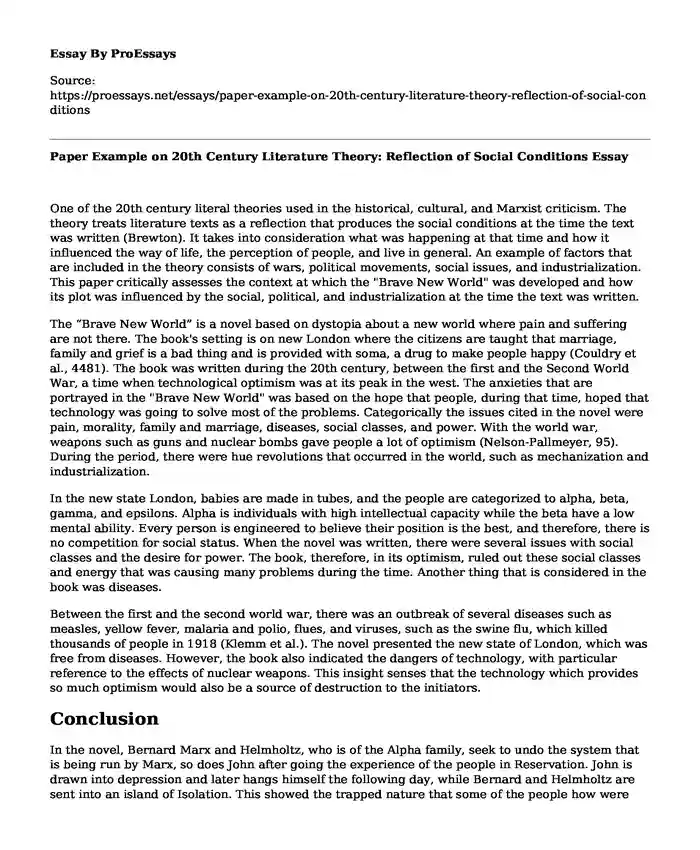One of the 20th century literal theories used in the historical, cultural, and Marxist criticism. The theory treats literature texts as a reflection that produces the social conditions at the time the text was written (Brewton). It takes into consideration what was happening at that time and how it influenced the way of life, the perception of people, and live in general. An example of factors that are included in the theory consists of wars, political movements, social issues, and industrialization. This paper critically assesses the context at which the "Brave New World" was developed and how its plot was influenced by the social, political, and industrialization at the time the text was written.
The “Brave New World” is a novel based on dystopia about a new world where pain and suffering are not there. The book's setting is on new London where the citizens are taught that marriage, family and grief is a bad thing and is provided with soma, a drug to make people happy (Couldry et al., 4481). The book was written during the 20th century, between the first and the Second World War, a time when technological optimism was at its peak in the west. The anxieties that are portrayed in the "Brave New World" was based on the hope that people, during that time, hoped that technology was going to solve most of the problems. Categorically the issues cited in the novel were pain, morality, family and marriage, diseases, social classes, and power. With the world war, weapons such as guns and nuclear bombs gave people a lot of optimism (Nelson-Pallmeyer, 95). During the period, there were hue revolutions that occurred in the world, such as mechanization and industrialization.
In the new state London, babies are made in tubes, and the people are categorized to alpha, beta, gamma, and epsilons. Alpha is individuals with high intellectual capacity while the beta have a low mental ability. Every person is engineered to believe their position is the best, and therefore, there is no competition for social status. When the novel was written, there were several issues with social classes and the desire for power. The book, therefore, in its optimism, ruled out these social classes and energy that was causing many problems during the time. Another thing that is considered in the book was diseases.
Between the first and the second world war, there was an outbreak of several diseases such as measles, yellow fever, malaria and polio, flues, and viruses, such as the swine flu, which killed thousands of people in 1918 (Klemm et al.). The novel presented the new state of London, which was free from diseases. However, the book also indicated the dangers of technology, with particular reference to the effects of nuclear weapons. This insight senses that the technology which provides so much optimism would also be a source of destruction to the initiators.
Conclusion
In the novel, Bernard Marx and Helmholtz, who is of the Alpha family, seek to undo the system that is being run by Marx, so does John after going the experience of the people in Reservation. John is drawn into depression and later hangs himself the following day, while Bernard and Helmholtz are sent into an island of Isolation. This showed the trapped nature that some of the people how were trying to break free at the time were going through.
Works Cited
Couldry, Nick, and Jun Yu. "Deconstructing ratification's brave new world." New Media & Society 20.12 (2018): 4473-4491.
Brewton Vince. "Literary Theory." Internet of Philosophy. EncyclopedUniversity of North Alabama. 2020. Retrieved from https://www.iep.utm.edu/literary/
Klemm, Celine, Enny Das, and Tilo Hartmann. "Swine flu and hype: a systematic review of media dramatization of the H1N1 influenza pandemic." Journal of Risk Research 19.1 (2016): 1-20.
Nelson-Pallmeyer, Jack. Brave new world order: must we pledge allegiance?. Wipf and Stock Publishers, 2017.
Cite this page
Paper Example on 20th Century Literature Theory: Reflection of Social Conditions. (2023, Sep 20). Retrieved from https://proessays.net/essays/paper-example-on-20th-century-literature-theory-reflection-of-social-conditions
If you are the original author of this essay and no longer wish to have it published on the ProEssays website, please click below to request its removal:
- Compare and Contrast Essay on The Lottery and the Prodigal Son
- Gender Roles in Literature Essay
- Literary Analysis Essay on Marie Howe's Poem "What the Living Do"
- The Importance of Service: A Reflection on Society and Education - Essay Sample
- Tolerance Through Forgiveness: Attitudes and Growing Together - Essay Sample
- Harry Potter: A Journey From Orphan to Magic World - Essay Sample
- Paper Example on Nurses' Challenges in Developing Appropriate Intercultural Communication Skills







